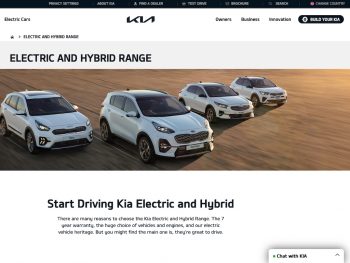Fuel panic triggers spike in electric car searches
Searches in electric cars have rocketed in recent days as the ‘fuel crisis’ sparks surging interest in EVs.

Sophus3 data shows on Friday, as the panic buying at petrol stations accelerated, visits to EV model pages on car brand sites had increased by almost 50% in just five days
Research from a number of sources shows that searches on electric cars have jumped in recent days on the back of panic buying and lengthy queues at petrol pumps, which were in turn sparked by media reports of petrol station closures from the HGV driver shortage.
Auto Trader said advert views for new and used electric models increased by a record 28% and 61% respectively over the weekend while it also reported a huge uplift in the number of people sending enquiries to retailers, with one sent every two minutes.
Analysis by the energy team at Uswitch has also revealed that the fuel panic is driving interest in electric vehicles and providing a starting point for many people to start seriously considering an electric car. Its data published today (28 September) shows that during the last 24 hours, there have been 91% more searches for electric cars, with drivers in Cheshire searching the most.
And view data from automotive digital specialist Sophus3 also shows increased traffic to car brands’ electric vehicle web pages.
It says that on Friday, as the panic buying accelerated, visits to electric vehicle model pages on car brand sites had increased by almost 50% in just five days. Searches for the term ‘electric car’ on google had also effectively doubled since the start of the week.
The question is whether such initial interest will galvanise drivers into actually making the move to EVs, particularly with the Government and motoring organisations suggesting the fuel situation will return to normal in the next few days.
Scott Gairns, Sophus3’s managing director, believes it does mark a turning point for EVs.
“With concerns that structural problems in the supply chain will mean further waves of panic buying over the autumn and winter months, we expect to see a hardening of consumer interest in EV models.
“Choosing an electric car is beginning to look like a sensible, pragmatic choice to guarantee mobility, as well as the right thing to do from an environmental point of view.”
Sean Kemple, managing director of Close Brothers Motor Finance, also said the current fuel concerns may well be the catalyst for motorists to go green.
“Vauxhall is bringing out eight new electric models, Volkswagen will be releasing six new greener vehicles and Toyota is looking at double-digit growth in its EV markets. The luxury of EV choice, alongside long petrol station queues, may be the tipping point for consumers who are steering towards non-carbon options.”
However, he cautioned that action is needed to ensure ongoing momentum.
“The UK car industry is at a pivotal point in its journey to electrification, with sales of alternatively fuelled vehicles continuing to surge. But for this trend to continue, we need to see the infrastructure in place to support alternatively fuelled vehicle ownership. An extra focus on the quality, as well as quantity, of charging networks is essential, which in many cases are not working as they should be. The car market has the opportunity to build back stronger, and greener, but it’s down to government support and industry collaboration to make that happen.”
And while Auto Trader said its online data suggests that people aren’t simply flirting with the idea of electric but have been encouraged to actively pursue a purchase, it’s unlikely to represent a major step towards the Government’s Road to Zero ambitions.
“That’s because electric cars are prohibitively expensive for the majority of people, and despite the significant increase in range performance among new models, capable of reaching around 250 miles on a single charge, concerns of an inadequate charging infrastructure remain,” said commercial director Ian Plummer.
“To make them a genuinely viable option for mainstream buyers, we need more commitment to provide greater incentives to deal with the upfront cost, as well as more investment to improve the national infrastructure to support both those rare long journeys, and those without access to home charging.
“Concern about petrol availability won’t end when the pumps start up again, and so this increased interest represents a unique opportunity to inform, to excite and to incentivise car owners to make the switch. If the Government is serious about reaching its 2030 targets, then it is one it can ill-afford to miss.”












